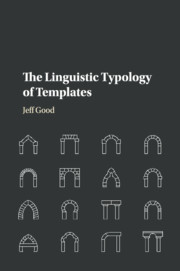Book contents
- Frontmatter
- Contents
- List of figures
- List of tables
- Acknowledgments
- Glossing abbreviations
- 1 Defining template
- 2 A typological description language for templates
- 3 Typologizing templates: case studies
- 4 Typologizing templates: comparison
- 5 Moving forward
- Appendix Specification of template description language
- References
- Author index
- Author index
- Term index
5 - Moving forward
Published online by Cambridge University Press: 05 February 2016
- Frontmatter
- Contents
- List of figures
- List of tables
- Acknowledgments
- Glossing abbreviations
- 1 Defining template
- 2 A typological description language for templates
- 3 Typologizing templates: case studies
- 4 Typologizing templates: comparison
- 5 Moving forward
- Appendix Specification of template description language
- References
- Author index
- Author index
- Term index
Summary
Next steps in the study of templatic constructions
The previous chapters of this book have examined how we can define templatic constructions, describe them, and compare them. A number of issues remain open which cannot be fully explored here, but they clearly merit consideration and will be briefly discussed in this chapter. These can be divided into two broad classes: (i) how can work within the general framework developed here be effectively extended (Section 5.2)? (ii) what has the present study taught us about the kinds of theoretical questions regarding templates that have animated the field until now (Section 5.3)?
Extending the present study
What is a valid sample?
A key limitation of the present study, which was felt especially acutely in Chapter 4, is that its limited sample size did not allow for the collection of robust statistical generalizations. The reasons for not having a larger sample were largely practical in nature: the difficulties in studying a “wastebasket” class of object such as templates (see Section 1.5), which further exhibit significant internal structural complexity, meant that devising an appropriate description language, and testing it for adequacy, is, in many respects, a more difficult endeavor than has been the case for earlier typological investigations. Of course, the approach taken here would have been completely impractical before the development of methods of data encoding, storage, and processing which only came into being quite recently. This largely explains why typological studies, to this point, have made use of highly reduced systems of categorization.
Nevertheless, the present work has established the feasibility of typologizing templatic constructions using a rich description language (and, by extension, many other similar “wastebasket” phenomena). Moreover, consistent with the experiences of work in the AUTOTYP project (Bickel & Nichols 2002) (see Section 2.7), after coding around the first ten or so templatic constructions, the description language began to stabilize to the point that, even when a new construction prompted modifications to its structure or content, these were comparatively limited in nature. It can still take an extensive amount of time to go from a published description of a templatic construction to one that is encoded in the database.
- Type
- Chapter
- Information
- The Linguistic Typology of Templates , pp. 259 - 271Publisher: Cambridge University PressPrint publication year: 2016

